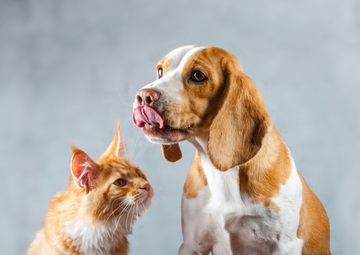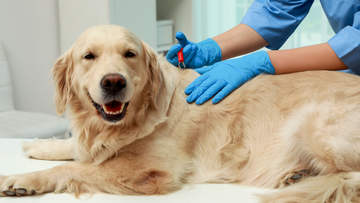Whether dog, cat, or horse – the intestine plays a central role in your animal's well-being. Although the digestive tract is often underestimated, it influences far more than just food digestion. The intestine is the center of the immune system, the control center for nutrient absorption, and closely connected to the nervous system.
In this article, you'll learn why a stable intestinal flora is crucial for your pet's health, what can upset its balance, and how you can gently support digestion.
Why the intestine plays such a central role in animals
The intestinal flora—the so-called microbiome—is a finely tuned ecosystem that influences the entire organism. The impact is particularly impressive in dogs: The number of microorganisms in the digestive tract far exceeds the number of body cells. These bacteria are not mere roommates, but active helpers. They influence how nutrients are utilized, how the immune system functions, and even how your pet feels and behaves.
A healthy gut is much more than just a functioning digestive system – it is the key to physical and mental health.
The intestine as a center for defense, energy and emotional balance
About 80 percent of the immune system is located in the gut. If the balance of the intestinal flora is disturbed or the intestinal wall is damaged, this impacts the entire immune system. Pathogens can multiply more easily, and the immune system becomes disrupted more quickly.
At the same time, the intestine is crucial for the supply of nutrients. An intact intestinal mucosa ensures that vital vitamins, minerals, and amino acids are absorbed in the correct amounts and harmful substances are kept out.
Added to this is the close connection between the gut and the nervous system. The gut communicates with the brain via neurotransmitters. If this balance is disturbed, it also affects behavior. Many animals then display nervousness, restlessness, or even aggression, without any identifiable trigger.
The importance of the microbiome in early development
Intestinal health is particularly important for young animals such as puppies, foals, or kittens, as it develops in the first weeks of life. Microorganisms begin to colonize the digestive tract as early as birth. Mother's milk, environmental stimuli, and the first feeds have a lasting impact on the microbiome.
This sensitive period determines how stable the immune system will be later on. An unfavorable development—for example, due to stress, poor-quality food, or unnecessary antibiotic administration—can have long-term consequences. Therefore, it is important to provide young animals with rest, high-quality nutrition, and, if necessary, targeted support during this time.
When balance is lost
The microbiome is as individual as a fingerprint—and unfortunately, just as sensitive. A sudden change in diet, psychological stress, or antibiotic treatment can quickly upset the finely tuned balance in the gut. Environmental toxins, an unbalanced diet, or chronic illnesses also have a negative impact on the intestinal flora and disrupt the interaction of microorganisms.
If the intestinal mucosa becomes weakened or permeable, not only important nutrients but also undesirable substances such as toxins or undigested particles enter the body in insufficient quantities. This can lead to inflammatory processes – often visible as skin problems, itching, or dull fur. Many animals then display symptoms that, at first glance, have nothing to do with the digestive system: a dog eats grass, a cat vomits more frequently, a horse appears restless or loses energy. Such changes are often caused by impaired nutrient utilization, which in turn is due to an imbalance in the intestine.
The skin and coat, in particular, often reflect the health of the digestive system particularly clearly. If the absorption of zinc, vitamin A, or essential fatty acids is impaired, the skin barrier suffers, leading to dryness, dandruff, or excessive hair loss. In such cases, external treatment is often not sufficient. Rather, it is worthwhile to consider the intestines as a possible cause and provide targeted support.
Enzymes – the silent helpers of digestion
In addition to a healthy intestinal flora, enzyme activity also plays a key role in the utilization of daily food. Digestive enzymes ensure that proteins, fats, and carbohydrates are broken down into their smallest components and can be absorbed by the body. Without this enzymatic support, many nutrients remain unused – even in high-quality food.
The body's own enzyme production can be impaired, especially in older animals, after a change in diet, or during periods of increased stress. In such cases, targeted supplementation can help improve feed utilization and ease digestive strain.
NN PetEnzym® Dog and NN PetEnzym® Cat address this issue: With purely plant-based enzyme sources from pineapple, papaya, kiwi, and mango, they provide natural support for the digestive process. The recipes are complemented by proven ingredients such as fennel and Yucca schidigera, as well as vitamin B12 – an important micronutrient that plays a particularly important role in older animals or during periods of stress. Both variants can be easily mixed into food and are ideal for daily support for dogs and cats with sensitive digestion or special needs.
What constitutes a gut-friendly diet?
Nutrition is the most important factor for healthy digestion. Not only the food itself is crucial, but also its composition and preparation. A gut-friendly meal contains high-quality protein, easily digestible fiber, and as few artificial additives as possible. Raw fiber from vegetables or herbs can also be helpful in promoting intestinal motility and strengthening the good bacteria.
Also, make sure to maintain regular feeding times, introduce new varieties slowly, and provide a quiet environment while feeding. Stress not only affects the stomach, but also the bacterial balance in the gut.
Take warning signals seriously – when digestion gets out of sync
Digestive problems come in many forms: bloating, frequent diarrhea, constipation, or bad breath are common symptoms. But even seemingly unrelated complaints such as itching, restlessness, or frequent scratching can have their origins in the intestines.
Flatulence, in particular, should not be taken lightly. It occurs when fermentation processes in the intestines take over—a sign that harmful bacteria are spreading. If the symptoms persist or occur repeatedly, a visit to the vet is recommended.
How you can support your pet's intestinal health
The foundation for a healthy gut is a species-appropriate lifestyle: high-quality food, sufficient exercise, established routines, and minimal stress. During sensitive periods—for example, after antibiotic therapy, deworming, or chronic digestive problems—targeted support can be beneficial.
This is where supplementary feed containing probiotics, prebiotics and herbal ingredients comes into play.

ENTEROGENIC Dog® | ENTEROGENIC Cat® | ENTEROGENIC Horse®
The ENTEROGENIC range offers recipes specifically tailored to dogs, cats, and horses to provide nutritional support for intestinal flora and digestion—all without harmful additives. They can help restore intestinal balance, improve nutrient utilization, and gently regulate digestion.
Conclusion: Health begins in the belly
A healthy gut is much more than just a functioning digestive system—it's the foundation for vitality, resilience, and well-being. Whether in young animals, during stressful phases of life, or for recovery after illness, keeping an eye on digestion provides your animal with holistic support, often more sustainably than it might seem at first glance.
If you notice changes in your pet's behavior, skin, or digestion, it's worth taking a closer look at what's happening inside. Because the path to a long, healthy life begins—quite literally—in the belly.










